Before和ago的区别
总结later

总结later、after、ago、before的区别:
1、later“…时间后”结构:时间段+later
常用于一般过去时。
They went to Beijing five days later.
(later单独在句尾,常用于将来时:I’ll see you later.)
2、after“…时间后”结构:after+时间段,常用于一般过去时,和1相同。
They went to Beijing after five days.
(after也可加句子:I’ll send y ou an e-mail after I get home. He found out the information after he had searched the Internet for thirty minutes.)
3、ago“…时间前”结构:时间段+ago, 用于一般过去时。
The Greens moved to Shanghai four weeks ago.
(since +时间段+ago,主句用现在完成时)
4、before 单独放在句尾,常用现在完成时:“以前”
I have been to London before. He has seen the film before.
(若是时间段+before, 则常用过去完成时,译为“…时间前”:
I had seen the film two weeks before. We had found out the answer to the problem an hour before.)。
before与ago、when,while,as区别

一、before与ago的区别1.ago表示“从现在起的若干时间以前”,意思是“距今……以前”,需和过去时或过去进行时连用。
before泛指“从过去起的若干时间以前”,意思是“距过去某时……以前”“与其……(毋宁)”,常和完成时连用,尤其在间接引语中,如:I visited him three days ago, but he had gone to Shanghai a week before.我三天前去访问他,但他已与那时的一周前到上海去了。
His parents died ten years ago.他父母十年前都去世了。
He said that his parents had died ten years before.他说他父母亲十年前都去世了。
I have never been there before.我以前从来没有去过那里。
2.如果不具体表明多少时间以前,只用before不用ago,意为“从前、以前”。
before仍以副词的形式置于被修饰语后,常与完成时候过去时连用。
如:Have you seen this film before?He asked me whether I had been to the Great Wall before.3.表示在某一点时间或事件以前时,只用before不用ago,这种用法是将before当作介词或连词使用。
ago不具有这一功能。
如:They will come back before six o’clock.It is hoped that this will be finished before the year 1995.希望这件工作将在1995年以前完成。
另外,before在句中的含义较多。
不少句子中,before虽然引导的也是一个时间状语,但是译成汉语时却不必译为“在……以前”。
a.如果before引导的从句动作发生得晚或慢,可译成“……才”。
ago和before的区别及用法有哪些
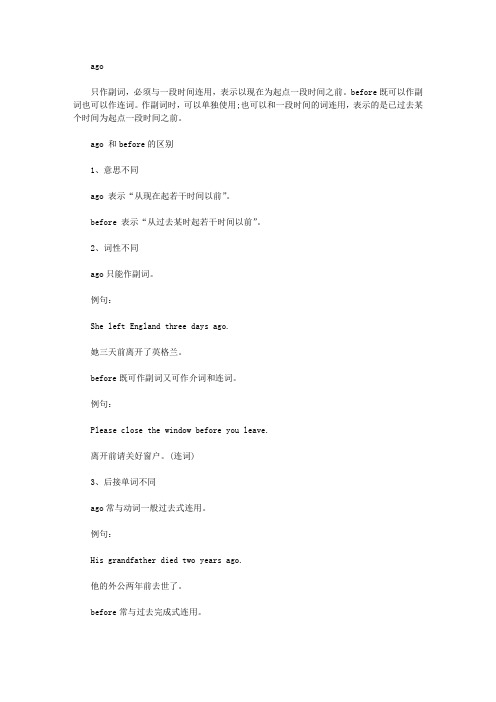
ago只作副词,必须与一段时间连用,表示以现在为起点一段时间之前。
before既可以作副词也可以作连词。
作副词时,可以单独使用;也可以和一段时间的词连用,表示的是已过去某个时间为起点一段时间之前。
ago 和before的区别1、意思不同ago 表示“从现在起若干时间以前”。
before 表示“从过去某时起若干时间以前”。
2、词性不同ago只能作副词。
例句:She left England three days ago.她三天前离开了英格兰。
before既可作副词又可作介词和连词。
例句:Please close the window before you leave.离开前请关好窗户。
(连词)3、后接单词不同ago常与动词一般过去式连用。
例句:His grandfather died two years ago.他的外公两年前去世了。
before常与过去完成式连用。
例句:I had finished the work two days before.两天前我就已经完成了工作。
ago的用法1、用于一般过去时。
例句:A short while ago, my sister helped me to carry one of my old bookcases upthe stairs.片刻之前,我妹妹帮我把我的一个旧书柜抬上了楼。
2、所指的时间是从现在算起。
例句:It was stolen twenty years ago when Ted was a boy of fifteen.那辆自行车是在20年前当泰德还是个15岁的小伙子时被偷去的。
before的用法1、用于过去完成时例句:A short time before, great trees had covered the countryside for milesaround.在那时不久之前,高大的树木覆盖着方圆数英里的地方。
2、它所指的时间不是从现在算起,而是从过去某一时刻算起,有时可以与previously 换用例句:Last summer, I finally left the firm that I had joined eighteen yearsbefore.去年夏天,我终于离开了从那时算起18年前我所参加的那个商行。
before/ago,since用法

before和ago都能表示在一段时间以前,但是二者的内涵和具体用法有明显的区别:1. before表示从过去或将来某一时间算起多少时间以前,由于与这一时间状语连用的行为先发生在过去或将来某一时刻之前,因此往往出现在过去完成时态或将来完成时态中。
例如:①I called him up last night,but his mother told me he had left for Wuhan two days before.②She said that she had married him five years before.2.如果不具体表明多少时间以前,before意为"从前;以前",表示从现在开始追溯到过去一段时间,或者主句的谓语动词表示的是经常、反复发生的行为,以副词的形式置于句末,可以用在现在完成时态中。
例如:①I have never been to Beijing before.②Have you ever seen a tiger before?③I often go over the lessons that I have learned a few days before.注意:before前的时间状语如果是特定的,含义不一样。
试比较:He said he had arrived here a day before. (一天前)He said he had arrived here the day before. (前一天)3. ago指的是从现在起到过去时间的某一点的一段时间。
这个时间状语常与一般过去时态或过去进行时态连用。
例如:①I graduated from the college twenty years ago.②I was asked what I was doing a month ago.4. 表示在某一时间点或事件以前时,只能用before,不用ago。
总结later

总结later、after、ago、before的区别:
1、later“…时间后”结构:时间段+later
常用于一般过去时。
They went to Beijing five days later.
(later单独在句尾,常用于将来时:I’ll see you later.)
2、after“…时间后”结构:after+时间段,常用于一般过去时,和1相同。
They went to Beijing after five days.
(after也可加句子:I’ll send y ou an e-mail after I get home. He found out the information after he had searched the Internet for thirty minutes.)
3、ago“…时间前”结构:时间段+ago, 用于一般过去时。
The Greens moved to Shanghai four weeks ago.
(since +时间段+ago,主句用现在完成时)
4、before 单独放在句尾,常用现在完成时:“以前”
I have been to London before. He has seen the film before.
(若是时间段+before, 则常用过去完成时,译为“…时间前”:
I had seen the film two weeks before. We had found out the answer to the problem an hour before.)。
[later和after的区别]later、after、ago、before的用法:
![[later和after的区别]later、after、ago、before的用法:](https://img.taocdn.com/s3/m/dd4be89ba1116c175f0e7cd184254b35eefd1af6.png)
[later和after的区别]later、after、ago、before的用法:篇一: later、after、ago、before的用法:later、after、ago、before的用法:①“一段时间+later/ago”分别表示“以后/以前”,主要用于过去时态。
②“after/before+某个时刻”分别表示“在某时刻之后/之前”,此时两个词是介词。
③ago与before:ago只能用于过去时,before用于完成时。
如:He had an accident a week ago.. . .篇二: late, later, latter, latest, lately的区别及用法1)late adj. & adv. 迟,迟的,晚的,晚期,在晚期。
如:He is never late for school. 他上学从不迟到。
The train was 10 minutes late. 火车晚点十分钟。
It’s never too la te to mend. 改过不为晚。
Better late than never. 迟做总比不做好。
The workers in the south often go to work early and leave off late.南下打工仔经常是早上工,晚下班。
请记住以下几种搭配:in the late afternoon 傍晚,在下午较晚的时候in the late 1990’s/1990s 在二十世纪九十年代末work late/far/deep into the night 工作至深夜late in autumn 深秋另外,late 用作形容词还可用来表示“已故的,去世不久的;前任的,不久前卸任的”。
如:the late Chairman Liu Shaoqi 前国家主席刘少奇the late government 前任政府2)later adj. & adv. 为late比较级,意指较迟,较晚一些。
初三英语中考语法详解(26)later 与 after,ago 与 before用法词义辨析

初三英语中考语法考点重难点详解(26)later 与after,ago 与before用法词义辨析因为词义相近,很多人分不清later 与 after,ago 与 before,要搞清楚他们的区别,关键得看用法。
1. later 与 after 最大的区别应该是:after 可以做连词,引导时间状语从句,而 later 只是个副词。
(1)时间段 + later:常用于过去,表示“稍后、......之后”A few minutes later, the the boss came in with my bag.几分钟之后,老板拿着我的包进来了。
later 也可以单独用,表示“从现在开始的以后”I will tell you later. 我以后会告诉你的。
表达一段时间之后表达一段时间之后,如果用在一般过去时,可以用:时间段+later,也可以用:after+时间段,例如:Two hours later, Jcak came back with an axe. 两小时之后,杰克拿着一把斧头回来了。
After two weeks later, they were both arrested. 两周之后,两个人都背逮捕了。
如果用在一般将来时,用in+时间段,例如:I will go to London in two weeks. 我两周之后去伦敦。
(2)after+时间点、时间段都可以, 多用于过去After 2 o'clock, they started to climb.两点过后,他们开始攀登。
After so many years in the US, he has changed a lot.在美国生活多年之后,他变了很多。
You mustn't come home after 10:30.你不准十点半之后才回家。
表示某时间点之后表示某时间点之后用:after+时间点after ten o'clock:十点之后after April 23rd:4月23号之后(3)after 可以引导从句,later 不能。
(完整版)in,after,later--ago与before的区别
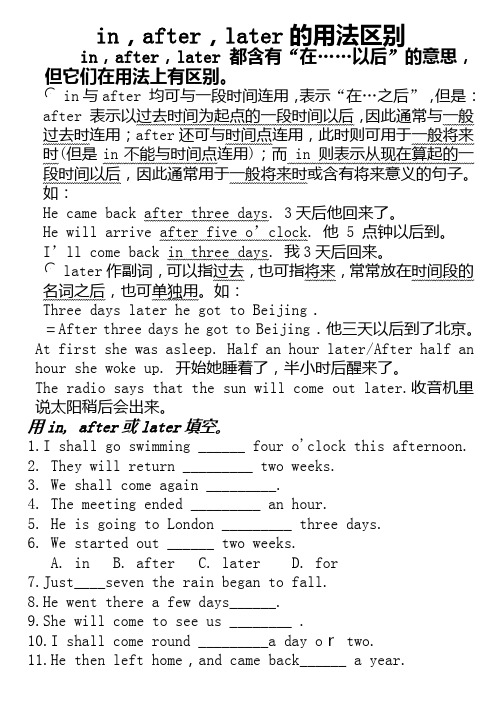
in,after,later的用法区别in,after,later 都含有“在……以后”的意思,但它们在用法上有区别。
in与after 均可与一段时间连用,表示“在…之后”,但是: after 表示以过去时间为起点的一段时间以后,因此通常与一般过去时连用;after还可与时间点连用,此时则可用于一般将来时(但是in不能与时间点连用);而 in 则表示从现在算起的一段时间以后,因此通常用于一般将来时或含有将来意义的句子。
如:He came back after three days. 3天后他回来了。
He will arrive after five o’clock. 他 5 点钟以后到。
I’ll come back in three days. 我3天后回来。
later作副词,可以指过去,也可指将来,常常放在时间段的名词之后,也可单独用。
如:Three days later he got to Beijing.=After three days he got to Beijing.他三天以后到了北京。
At first she was asleep. Half an hour later/After half an hour she woke up. 开始她睡着了,半小时后醒来了。
The radio says that the sun will come out later.收音机里说太阳稍后会出来。
用in, after或later填空。
1.I shall go swimming ______ four o'clock this afternoon.2. They will return _________ two weeks.3. We shall come again _________.4. The meeting ended _________ an hour.5. He is going to London _________ three days.6. We started out ______ two weeks.A. inB. afterC. laterD. for7.Just____seven the rain began to fall.8.He went there a few days______.9.She will come to see us ________ .10.I shall come round _________a day or two.11.He then left home,and came back______ a year.参考答案:1. after2. in3. later4. after5. in6.B7.afterterter 10.in 11.after“以前”解,但是用法是有区别的:1、ago放在表示时间段的词语后,意思是“从现在算起的若干时间以前”,谓语动词常使用一般过去时。
in,after,later--ago与before的区别
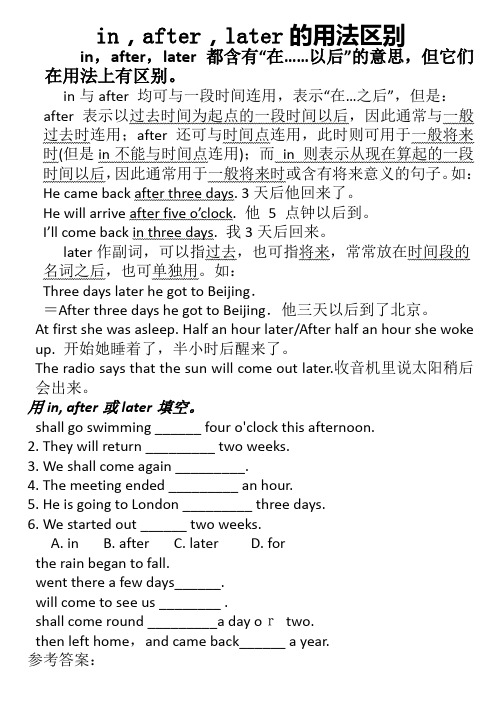
in,after,later的用法区别in,after,later 都含有“在……以后”的意思,但它们在用法上有区别。
in与after 均可与一段时间连用,表示“在…之后”,但是:after 表示以过去时间为起点的一段时间以后,因此通常与一般过去时连用;after还可与时间点连用,此时则可用于一般将来时(但是in不能与时间点连用);而in 则表示从现在算起的一段时间以后,因此通常用于一般将来时或含有将来意义的句子。
如:He came back after three days. 3天后他回来了。
He will arrive after five o’clock. 他5 点钟以后到。
I’ll come back in three days. 我3天后回来。
later作副词,可以指过去,也可指将来,常常放在时间段的名词之后,也可单独用。
如:Three days later he got to Beijing.=After three days he got to Beijing.他三天以后到了北京。
At first she was asleep. Half an hour later/After half an hour she woke up. 开始她睡着了,半小时后醒来了。
The radio says that the sun will come out later.收音机里说太阳稍后会出来。
用in, after或later填空。
shall go swimming ______ four o'clock this afternoon.2. They will return _________ two weeks.3. We shall come again _________.4. The meeting ended _________ an hour.5. He is going to London _________ three days.6. We started out ______ two weeks.A. inB. afterC. laterD. forthe rain began to fall.went there a few days______.will come to see us ________ .shall come round _________a day ortwo.then left home,and came back______ a year.参考答案:1. after2. in3. later4. after5. in“以前”解,但是用法是有区别的:1、ago放在表示时间段的词语后,意思是“从现在算起的若干时间以前”,谓语动词常使用一般过去时。
before 的用法
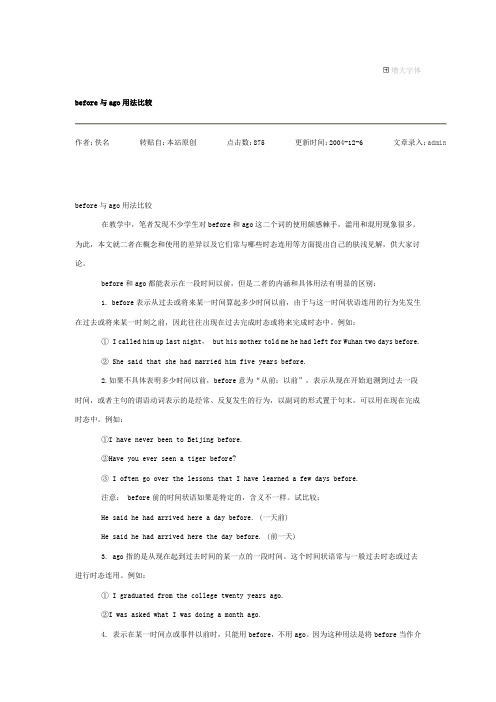
增大字体before与ago用法比较作者:佚名转贴自:本站原创点击数:875 更新时间:2004-12-6 文章录入:adminbefore与ago用法比较在教学中,笔者发现不少学生对before和ago这二个词的使用颇感棘手,滥用和混用现象很多。
为此,本文就二者在概念和使用的差异以及它们常与哪些时态连用等方面提出自己的肤浅见解,供大家讨论。
before和ago都能表示在一段时间以前,但是二者的内涵和具体用法有明显的区别:1. before表示从过去或将来某一时间算起多少时间以前,由于与这一时间状语连用的行为先发生在过去或将来某一时刻之前,因此往往出现在过去完成时态或将来完成时态中。
例如:① I called him up last night, but his mother told me he had left for Wuhan two days before.② She said that she had married him five years before.2.如果不具体表明多少时间以前,before意为“从前;以前”,表示从现在开始追溯到过去一段时间,或者主句的谓语动词表示的是经常、反复发生的行为,以副词的形式置于句末,可以用在现在完成时态中。
例如:①I have never been to Beijing before.②Have you ever seen a tiger before?③ I often go over the lessons that I have learned a few days before.注意: before前的时间状语如果是特定的,含义不一样。
试比较:He said he had arrived here a day before. (一天前)He said he had arrived here the day before. (前一天)3. ago指的是从现在起到过去时间的某一点的一段时间。
before与ago用法比较

before与ago用法比较before和ago 两者均可表示在多久时间“以前”(要放在表示一段时间的词语之后),但有区别:ago 从现在向前回溯,即现在的过去,因此通常与一般过去时连用;而before 则从过去向前回溯,即指过去的过去,因此通常与过去完成时连用(尤其用于宾语从句中)。
但是二者的内涵和具体用法有明显的区别:1. before表示从过去或将来某一时间算起多少时间以前,由于与这一时间状语连用的行为先发生在过去或将来某一时刻之前,因此往往出现在过去完成时态或将来完成时态中。
例如:① I called him up last night,but his mother told me he had left for Wuhan two days before.② She said that she had married him five years before.He said they had left five days before. 他说他们5 天前就离开了。
2.如果不具体表明多少时间以前,before意为“从前;以前”,表示从现在开始追溯到过去一段时间,或者主句的谓语动词表示的是经常、反复发生的行为,以副词的形式置于句末,可以用在现在完成时态中。
例如:①I have never been to Beijing before.②Have you ever seen a tiger before?③ I often go over the lessons that I have learned a few days before.注意:before前的时间状语如果是特定的,含义不一样。
试比较:He said he had arrived here a day before. (一天前)He said he had arrived here the day before. (前一天)注:在表示推测或为使语境生动的句子中,有时也可用 ago 代替before。
ago与before的用法和person与people的用法

ago与before的用法:
ago 副词,意为“以前”。
例句:I met her two years ago.
我两年前见过她。
How long ago did you see the film?
你多久以前看过这部电影?
固定搭配:long long ago 很久很久以前
a moment ago 刚才
ago用于被修饰词以后,常和一般过去时的动词连用。
ago:指从现在算起若干时间以前,动词过去式。
before:指从过去算起的某个时间之前。
例句:T wo days ago I went to visit him,but he had gone to Beijing four days before.
两天前我去拜访他,但他已于四天前去了北京。
person与people的用法:
person名词,意为“人”。
例句:He is a person of importance for them.
对他们来说,他是个重要人物。
I think Lucy is the best person for the job.
我认为露西是做这项工作的最佳人选。
person:着重指个别人,有单、复数形式。
people:着重指人的集体,没有复数形式,但有复数
含义。
指“民族”时有复数形式。
例句:We need a person to help us.
我们需要有个人帮忙。
There are lots of people in the hall.
大厅里有许多人。
before与ago用法口诀
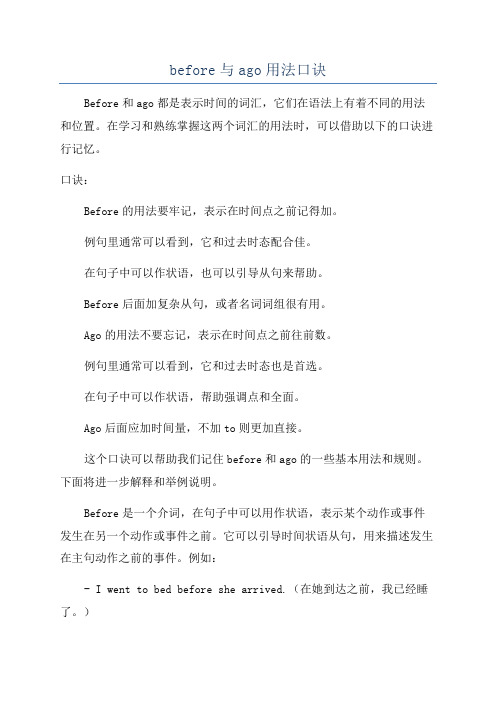
before与ago用法口诀Before和ago都是表示时间的词汇,它们在语法上有着不同的用法和位置。
在学习和熟练掌握这两个词汇的用法时,可以借助以下的口诀进行记忆。
口诀:Before的用法要牢记,表示在时间点之前记得加。
例句里通常可以看到,它和过去时态配合佳。
在句子中可以作状语,也可以引导从句来帮助。
Before后面加复杂从句,或者名词词组很有用。
Ago的用法不要忘记,表示在时间点之前往前数。
例句里通常可以看到,它和过去时态也是首选。
在句子中可以作状语,帮助强调点和全面。
Ago后面应加时间量,不加to则更加直接。
这个口诀可以帮助我们记住before和ago的一些基本用法和规则。
下面将进一步解释和举例说明。
Before是一个介词,在句子中可以用作状语,表示某个动作或事件发生在另一个动作或事件之前。
它可以引导时间状语从句,用来描述发生在主句动作之前的事件。
例如:- I went to bed before she arrived.(在她到达之前,我已经睡了。
)除了引导时间从句,before还可以和不定式和动词原形构成复杂结构,表示某个动作在另一个动作之前发生。
例如:- I wanted to eat breakfast before leaving the house.(在离开房间之前,我想吃早饭。
)注意,在上面的例句中,不定式动词“to eat”的动作在动词“leaving”的动作之前发生。
Ago是一个副词,用来表示从过去某个时间点开始,往前数的时间。
它通常和过去时态一起使用,表示过去发生的事情。
例如:- I saw him two hours ago.(我两小时前见到了他。
)- He finished his work a week ago.(他一周前完成了工作。
)Ago通常用来强调一个特定的时间点,直接表达时间的过去。
它可以用作句子的状语,帮助我们更清晰地描述时间的发生顺序或间隔。
例如:需要注意的是,在使用ago时我们不需要加“to”,直接加上时间量即可。
ago和before的区别

ago和before的区别在哪里啊1.ago表示“从现在起的若干时间以前”,意思是“距今……以前”,需和过去时或过去进行时连用。
before泛指“从过去起的若干时间以前”,意思是“距过去某时……以前”“与其……(毋宁)”,常和完成时连用,尤其在间接引语中,如:I visited him three days ago, but he had gone to Shanghai a week before.我三天前去访问他,但他已与那时的一周前到上海去了。
His parents died ten years ago.他父母十年前都去世了。
He said that his parents had died ten years before.他说他父母亲十年前都去世了。
I have never been there before.我以前从来没有去过那里。
2.如果不具体表明多少时间以前,只用before不用ago,意为“从前、以前”。
before仍以副词的形式置于被修饰语后,常与完成时候过去时连用。
如:Have you seen this film before?He asked me whether I had been to the Great Wall before.3.表示在某一点时间或事件以前时,只用before不用ago,这种用法是将before当作介词或连词使用。
ago不具有这一功能。
如:They will come back before six o’clock.It is hoped that this will be finished before the year 1995.希望这件工作将在1995年以前完成。
另外,before在句中的含义较多。
不少句子中,before虽然引导的也是一个时间状语,但是译成汉语时却不必译为“在……以前”。
a.如果before引导的从句动作发生得晚或慢,可译成“……才”。
2014潍坊中考英语词语辨析:agobefore
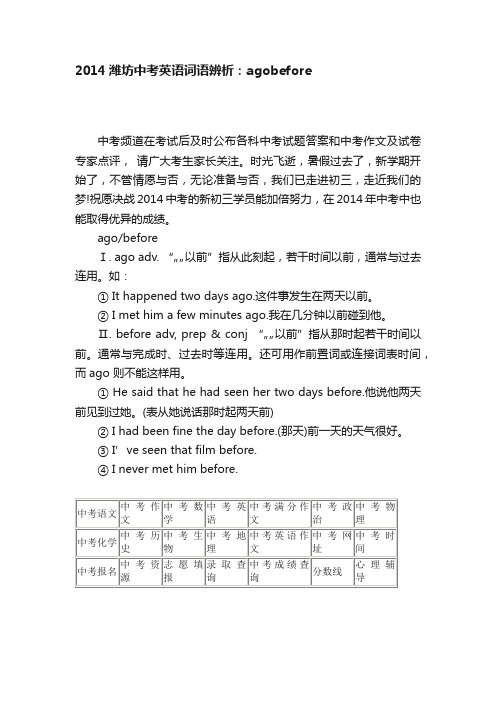
2014潍坊中考英语词语辨析:agobefore
中考频道在考试后及时公布各科中考试题答案和中考作文及试卷专家点评,请广大考生家长关注。
时光飞逝,暑假过去了,新学期开始了,不管情愿与否,无论准备与否,我们已走进初三,走近我们的梦!祝愿决战2014中考的新初三学员能加倍努力,在2014年中考中也能取得优异的成绩。
ago/before
Ⅰ. ago adv. “……以前”指从此刻起,若干时间以前,通常与过去连用。
如:
① It happened two days ago.这件事发生在两天以前。
② I met him a few minutes ago.我在几分钟以前碰到他。
Ⅱ. before adv, prep & conj “……以前”指从那时起若干时间以前。
通常与完成时、过去时等连用。
还可用作前置词或连接词表时间,而ago 则不能这样用。
① He said that he had seen her two days before.他说他两天前见到过她。
(表从她说话那时起两天前)
② I had been fine the day before.(那天)前一天的天气很好。
③ I’ve seen that film before.
④ I never met him before.。
- 1、下载文档前请自行甄别文档内容的完整性,平台不提供额外的编辑、内容补充、找答案等附加服务。
- 2、"仅部分预览"的文档,不可在线预览部分如存在完整性等问题,可反馈申请退款(可完整预览的文档不适用该条件!)。
- 3、如文档侵犯您的权益,请联系客服反馈,我们会尽快为您处理(人工客服工作时间:9:00-18:30)。
before ago
before和ago都能表示在一段时间以前,但是二者的内涵和具体用法有明显的区别:
1. before表示从过去或将来某一时间算起多少时间以前,由于与这一时间状语连用的行为先发生在过去或将来某一时刻之前,因此往往出现在过去完成时态或将来完成时态中。
例如:
①I called him up last night,but his mother told me he had left for Wuhan two days before.
②She said that she had married him five years before.
2.如果不具体表明多少时间以前,before意为"从前;以前",表示从现在开始追溯到过去一段时间,或者主句的谓语动词表示的是经常、反复发生的行为,以副词的形式置于句末,可以用在现在完成时态中。
例如:
①I have never been to Beijing before.
②Have you ever seen a tiger before?
③I often go over the lessons that I have learned a few days before.
注意:before前的时间状语如果是特定的,含义不一样。
试比较:
He said he had arrived here a day before. (一天前)
He said he had arrived here the day before. (前一天)
3. ago指的是从现在起到过去时间的某一点的一段时间。
这个时间状语常与一般过去时态或过去进行时态连用。
例如:
①I graduated from the college twenty years ago.
②I was asked what I was doing a month ago.
4. 表示在某一时间点或事件以前时,只能用before,不用ago。
因为这种用法是将before当作介词或连词使用。
ago不具有这种功能。
例如:
①He will come back before eleven o'clock.
②Where did your brother study before he joined the army?
③It was hoped that this would be achieved before the year 2006.
5.按语法规则,ago只能与一般过去时连用,但在since three years ago这类短语中能与现在完成时态连用。
因为three years ago构成一个名词短语,共同
作since的宾格,意为"自从三年前以来"。
例如:
①He has been here since three years ago.
②I have taught English in this school since twenty years ago.
6. 含before的从句一般不用将来时态,如果采用"will / would +V."时,一般被认为是情态或虚拟语气。
例如:
I would die before I would confess to it.
7.如果before从句是一般过去时态,所暗示的是过去发生的事,主句则宜用
过去完成时,语义偏重于过去某阶段的行为或状况时,还可与一般过去时态连用。
例如:
①I had never seen a Red Army man before I arrived in Xi'an.
②They asked me things that happened before the boy was born.
8. 不少的语法书上说,before引导的从句习惯上不与否定的主句连用,要用until。
实际上二者都可以,有时在意义上有些区别。
试比较:
He didn't arrive until I returned. 直到我回来时他才到达。
He did not arrive before I returned. 在我回来之前他尚未到达。
I didn't manage to do it until you had explained how. 直到你解释了如何干,
我才设法完成了那项工作。
I didn't manage to do it before you had explained how. 你解释了如何干之后,我才设法完成了那件工作。
9. before在句中的含义比较灵活,虽然before引导的也是一个时间状语,但译成汉语时却不必死译为"在……以前"。
可以采取下面几种译法:(A)译为"……才";(B)译为"……就";(C)译为"尚未"、"还没有"、"来不及"、"不要"、"别";(D)
译为"在……的时候还没有";(E)译为"如果"、"否则"、"免得";(F)译为"到"、"等到"、"没等……就";(G)译为"然后"等。
例如:
A. It will be five years before we meet again. 要等五年我们才能再见面。
We waited a long time before the train arrived. 我们等了很长时间火车才到达。
B. I hadn't waited long before he came. 我没等多久他就来了。
He had not gone a mile before he felt tired. 还没走一英里路,他就觉得累了。
C. His father died before he was born. 他尚未出世他父亲就去世了。
Catch him before he escapes. 抓住他,别让他跑了。
Take this computer before you change your mind. 买了这台电脑,不要三心二意了。
D. We arrived there before it began to rain. 我们到达那里的时候还没下雨。
E. Go before I call the police. 走吧,否则我叫警察了。
I had better go now before it is too late. 我最好现在就走,免得太迟。
Pigs will fly before he'll be a scientist. 如果他当科学家,猪都会飞了。
F. The crops will die before the rain fall. 等到天下雨,庄稼早枯死了。
Before I could sit down, he offered me a cup of tea. 没等我坐下,他就给我端上一杯茶。
G. I shaved before I went to the party. 我刮了脸,然后去参加宴会。
